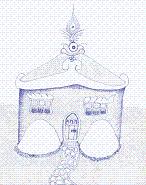Be Kind! Share with your Team, with your Family, with your Buddies!
Click The Button Now & Like This On Your Facebook Page!
Tuesday, November 26, 2013
Home Loan Application Tips
1. Down payment: the amount of money you must put up to secure your loan.
2. Principal: the amount you are borrowing for your mortgage. This amount does not include interest.
3. Interest rate: a set percentage that is added to the principal. Principal and interest together make up your monthly payment. Interest rates are usually negotiable.
4. Points: one point equals one percent of the total loan amount. Points are charged as fees by lenders to complete your loan. They may be paid up front or in some cases added into your monthly payments. Points are usually negotiable.
5. Term of loan: how long the mortgage lasts. The most common mortgages are 30 years and 15 years, but there are many options as well.
6. Balloon payment: one big lump sum payment, usually due three to seven years after the mortgage begins. Balloon payments only apply to balloon mortgages. See details on balloon mortgages online for a better understanding of it.
7. Mortgage insurance: this is an extra cast required when you get a loan for 90% or more of the purchase price. It is usually added into your monthly payments. A typical fee for mortgage insurance would be $2,500 to $3,500.
8. Up-front costs: these costs include escrow fees, title search costs, appraised fees, and land survey fees. They vary from lender to lender. This is one area where you can save money by shopping around.
9. Loan repayment schedule: a statement of how much you must pay every month for your mortgage. Loan payments may be the same every month or vary according to changes in interest rates. See the descriptions of different types of mortgages in certain mortgage sites online.
10. Prepayment or late payment penalties: many lenders charge extra money when you make your monthly mortgage payment early and late. These penalties vary greatly from lender to lender; always ask for details before you sign a mortgage contract.
This is the anatomy of a home mortgage and it would help for you to know it when applying for a loan. Not only will it give you a better idea on what to prepare for but it will also give you a hint on which part of the application you may have trouble with. In such applications, it is best to know every detail and make sure you have everything you need to get things done.
The best home lenders serve as middlemen between clients and lenders. You can get a home mortgage with the help of a mortgage broker.















